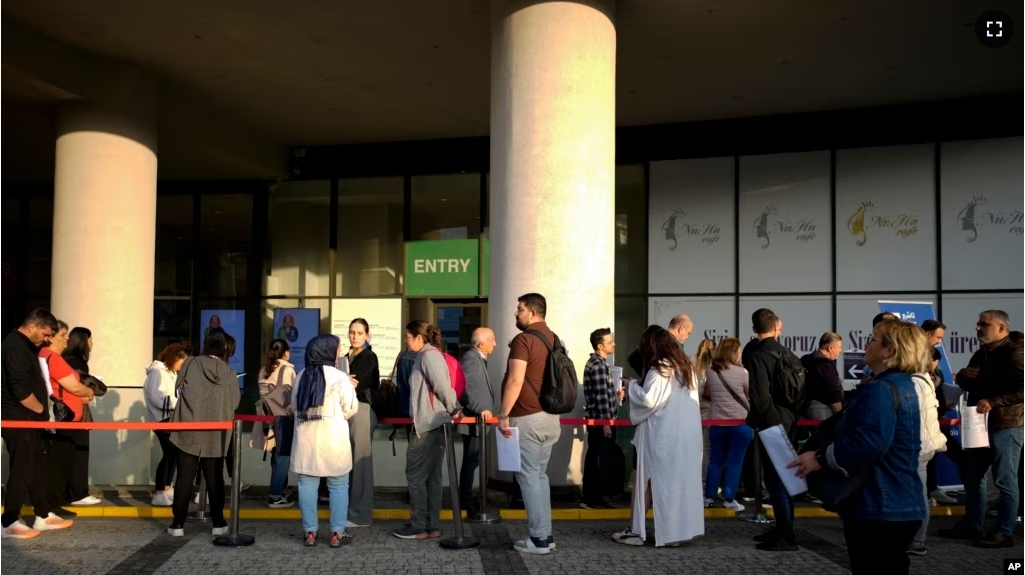Economic problems and fears of repression in Turkey have caused Huseyin Buyukdag to make a decision. The teacher and his wife want to move to Germany to find a better life.
They are among a growing number of young and educated people who say they want to leave Turkey. They say their rights and freedoms there are being taken away, and inflation is high under President Recep Tayyip Erdogan.
After Erdogan secured a third term in office in May elections, things are unlikely to change, Buyukdag said.
“Even if I don’t want this, even if I hate this, I will…leave this beautiful country,” the 27-year-old English teacher told The Associated Press (AP).
Turkey is a country of over 84 million people. Several crises have affected Turkey in recent years. The official yearly inflation rate was 61 percent last month. Some economists believe the real number is double that.
For many, the way out is through education visas to study in other countries or work permits. TurkStat is the government’s agency for official numbers, or statistics. It said 139,531 Turkish citizens left the country in 2022, compared to 103,613 in 2021. Those aged 25 to 29 formed the biggest group.
The numbers are a big increase from 77,810 Turks who left in 2020, when the coronavirus pandemic was at its highest.

Besim Dellaloglu is a sociologist. He believes people are leaving because of the disappearance of normal things in a democracy. Some are calling the movement of people to foreign countries “brain drain.”
Brain drain happens when highly trained or educated people leave a country for a better life somewhere else.
Dellaloglu does not believe the brain drain will go away without “decreasing polarization in Turkey.”
He said the most likely to leave are medical workers and those that work with technology. Highly trained individuals from all fields are also leaving.
Many other Turks prefer to stay, even with the problems.
“I can understand the people who are leaving, some things really need to change,” said Fatma Zehra Eksi. She is a 22-year-old student from Istanbul. She noted, “But if we…leave because we are not comfortable here, then there will be no one left here to change things.”
The growing lack of happiness comes as Turkey marks the 100th anniversary of Ataturk’s establishment of the country as a secular republic. Ataturk was the first president of Turkey after the collapse of the Ottoman Empire.
Some Turks hoping to leave Turkey say that even getting a tourist visa, seen as a step to immigration, has become difficult.
AP spoke to many people considering emigration from Turkey. They said European countries have increased visa restrictions for Turkish travelers. These people and reports in Turkish media say the rate of visa rejections has increased and the process has become more complex.
Nikolaus Meyer-Landrut is a European Union diplomat for Turkey. He said rejections in Turkey were below the worldwide average. He told the Hurriyet newspaper in June that the EU has no policy of blocking visas for Turkish citizens.
Erdogan’s government considers the reported visa rejections an effort to hurt support for his government by making Turks feel they cannot travel freely to Europe.
His government has promised to bring people home and turn back the brain drain. Erdogan has offered money in the form of grants, and jobs to Turks teaching in other countries. He said 6,000 people had returned under the plan.
However, Buyukdag, the teacher, said he and his wife have stepped up their efforts to leave a country where, he said, he could lose his job for saying the “wrong things.”
“In Germany or in any Western country, you are a valuable person,” he said. “In Turkey, you are not a valuable person because you can be called a traitor any time.”
I’m Gena Bennett.
Seth Borenstein reported this story for The Associated Press. Gregory Stachel adapted the story for VOA Learning English.
______________________________________________
Words in This Story
sociologist –n. a person who studies society, social organizations and social behaviors
polarize – v. to cause (people or opinions) to separate into opposing groups
comfortable – adj. allowing you to be relaxed: causing no worries, difficulty, or uncertainty
secular – adj. not related to religious things
tourist – n. a person who travels to a place for pleasure
emigration – n. the process of leaving a country to live in another one
traitor – n. a person who betrays a country or group of people by helping or supporting an enemy
